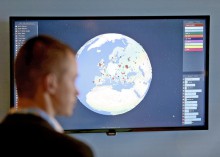The event was attended by over 500 professionals in the field of computer technology and cybersecurity who came from 20 countries. The opening of such a major event for Ukraine attracted the attention of not only experts, but also representatives of the Ukrainian government, foreign ambassadors, scientists, and businesspeople. After all, cybersecurity is growing more important for Ukraine by the year, as many speakers mentioned in their speeches the case of cyberattacks on power companies which had left 80,000 consumers in the dark for a time.
“In today’s Ukraine, cybersecurity affects successful implementation of government initiatives and our efforts to build up civil society, combat corruption, and win public trust,” said Deputy Minister of Economy of Ukraine Mykhailo Titarchuk. He stressed that the president of Ukraine and the prime minister had pointed to a need to support and develop the IT industry as a strategically important one for the Ukrainian economy, and practical steps had already been taken in this direction, including a law that has simplified services export procedures to help development of the IT industry and a presidential decree aiming to increase the number of IT professionals. Titarchuk cited the case of 2016 cyberattacks on the services of the Treasury and the Ministry of Finance of Ukraine which prompted the Cabinet to allot 80 million hryvnias from the reserve fund of the state budget of Ukraine for the restoration and improvement of the reliability of its information and telecommunication systems. “Thus, implementing a new system of cyberspace protections is a priority for Ukraine,” he stressed.
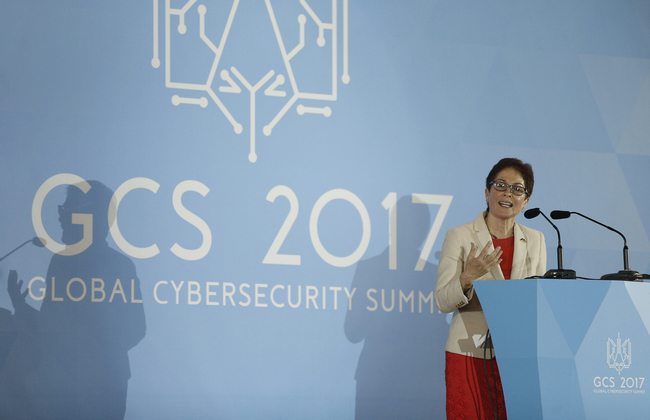
The opening of the summit was also attended by Secretary of the National Reform Council, Deputy Head of the Presidential Administration Dmytro Shymkiv. He said we faced global security threats daily. His colleagues in the Presidential Administration experienced their impact as well.
According to Shymkiv, no technology can protect against such attacks in the contemporary world, it can only be achieved by human intelligence. Therefore, one of the objectives of the summit was to find ways to nurture professionals who could deal with criminals – “not with malware but with malefactors who create it.”
Shymkiv recalled the attacks on energy infrastructure in Ukraine and attempts to interfere in elections. “Legislation and security measures all over the world are not ready for it. After all, we often hear people asking where you draw the line between security needs and freedom of speech. However, it is freedom of speech that is used by hackers, terrorists, and geopolitical warriors to undermine freedom of speech.” Shymkiv talked about three aspects that, in his opinion, were important for cybersecurity in the modern world: education, cooperation between cybersecurity teams, and new legislation.
The presentation delivered by Ambassador of Israel to Ukraine Eliav Belotserkovsky was extremely useful as an example for Ukraine, as he spoke on his country’s approach to cybersecurity.
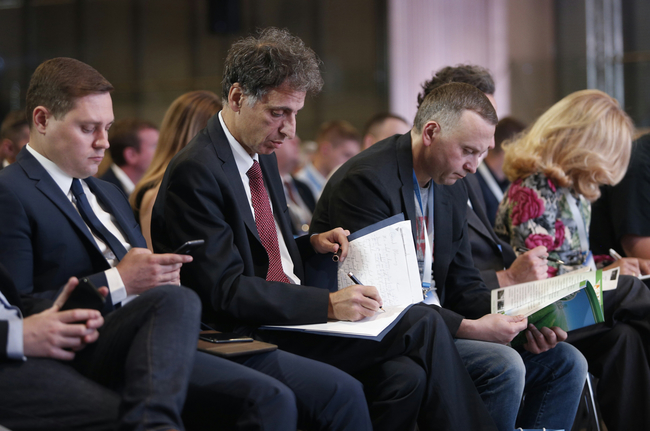
“Since its very foundation, Israel has had to deal with conflict, and cyberthreat has become one of the main threats to the State of Israel lately,” the ambassador said. According to him, Israel has more than 360 registered companies that deal with cybersecurity, over 10 percent of cybersecurity firms’ investment is directed to Israel, and about 5 percent of all cyberproducts sold in the world market are made in Israel. “To find the right answers to the cybersecurity challenges, the Israeli government has created a kind of ecosystem,” he said. “What we are trying to do is to protect our government and national leadership from threats.”
“We place greatest weight on human resource development. We believe it to be a key task. We are trying to start it as soon as possible to get a highly professional team in a few years,” said the ambassador and stressed that this initiative was already being implemented in schools in Israel. The next step has to do with the military. According to Belotserkovsky, there are special units in it that deal with the “warfare of the future which is cyberwarfare.” In addition, cybersecurity is taught in Israeli universities. “In Israel, we have created a dedicated small cybercity in Beersheba,” he said, and added that it offered a unique combination of university education and business environment. In addition, Israel has government institutions dealing with cybersecurity, the most important of them being the SOC (Security Operation Center) which monitors all kinds of attacks or threats of attacks on government, and the CERT (Cyber Event Response Team) which employs experts who have to cope with these attacks and find ways of solving such problems.
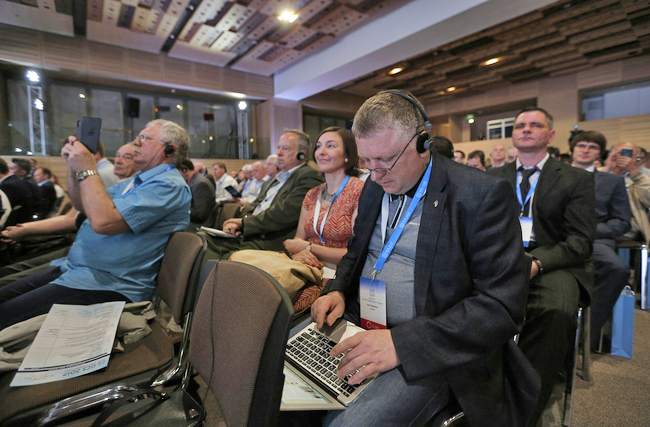
“Here in Ukraine, you have excellent potential to develop the right people and become a true superpower in the field of cybersecurity, and of course, we are ready to cooperate,” concluded Belotserkovsky.
US Ambassador to Ukraine Marie Yovanovitch also delivered a speech at the summit’s opening. “We know that cyberthreats and cyberattacks recognize no borders,” said the ambassador. “That is why we need to come together to counter this threat. This means that we need to be closer, to share experiences and help each other,” she observed.
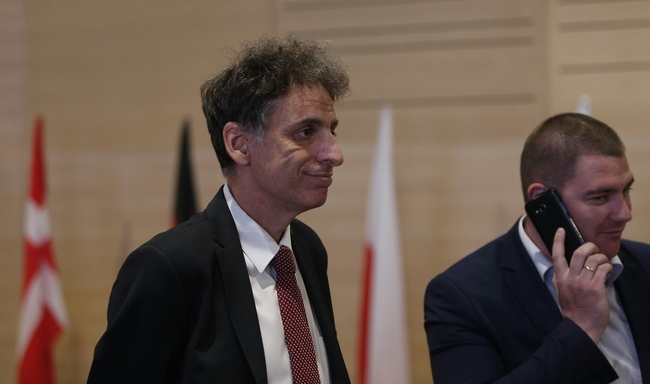
Yovanovitch also emphasized the Ukrainian-American cooperation on cybersecurity. “We are proud of how we are helping Ukraine. It is also great that we are getting help from Ukraine. It is a real partnership. After the 2016 attacks, our Ukrainian colleagues shared information about them that has helped Americans avoid future attacks. On an earlier occasion in 2015, we sent a team of experts to Ukraine to assist the government of Ukraine. We conducted training and provided equipment. We also plan to conduct training for Ukrainian experts on cybersecurity who work for energy companies, state security organizations, and the Ministry of Defense to improve the security status of Ukrainian technical infrastructure,” said Yovanovitch.
Former US Deputy Secretary of State (2015-17) Antony Blinken also took part in the summit, and his speech touched upon Russian meddling in the electoral process in the US. According to him, by interfering in an American election, Russian President Vladimir Putin wanted to “undermine faith in the American democratic process... At the same time, Putin is trying to demonstrate to his people that all the systems are corrupt, all the systems lie. But this is not an objective truth. What Putin did in the US, he probably did also in Western Europe, including France and Germany, in Georgia, and perhaps even recently in Qatar as well,” said Blinken. According to him, Russia has been launching some highly sophisticated cyberattacks in Ukraine, in particular, to support violence in eastern Ukraine.
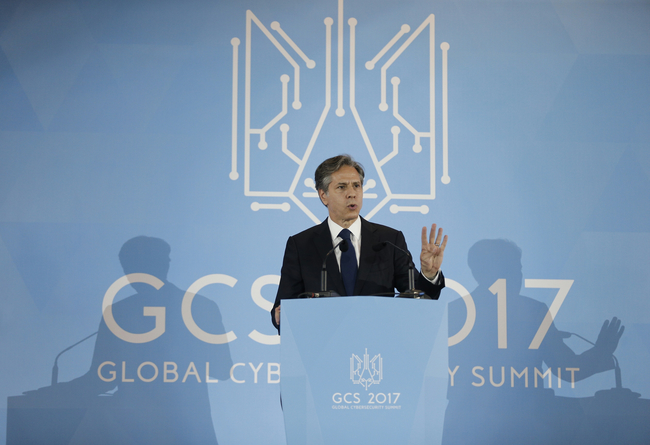
“It has been close to four difficult years since the Ukrainians came to Maidan. However, the Ukrainians’ resilience, their strength, optimism, and dedication to tough reforms have continued to inflict defeat on every attempt to make this country fail. I am very proud that the US stands firmly on the side of Ukraine,” said Blinken.
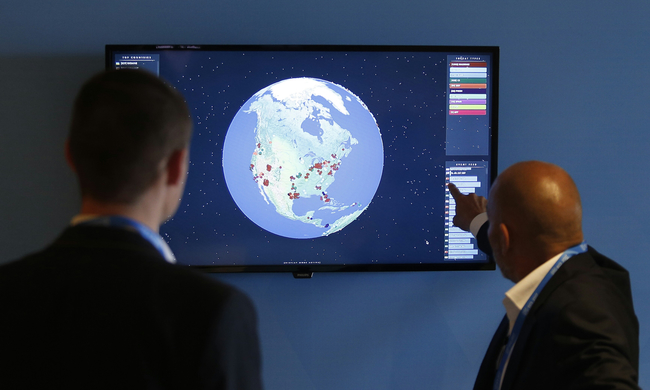
During the two days of the summit, its participants had the opportunity to listen to reports of cybersecurity experts, to participate in panel discussions or join the interactive dialog with other participants of the event.
As its founder Dmytro Shuval remarked, “in three years, this event will be the largest in Eastern Europe, and in five years, it will become one of the largest such gatherings in Europe.”

